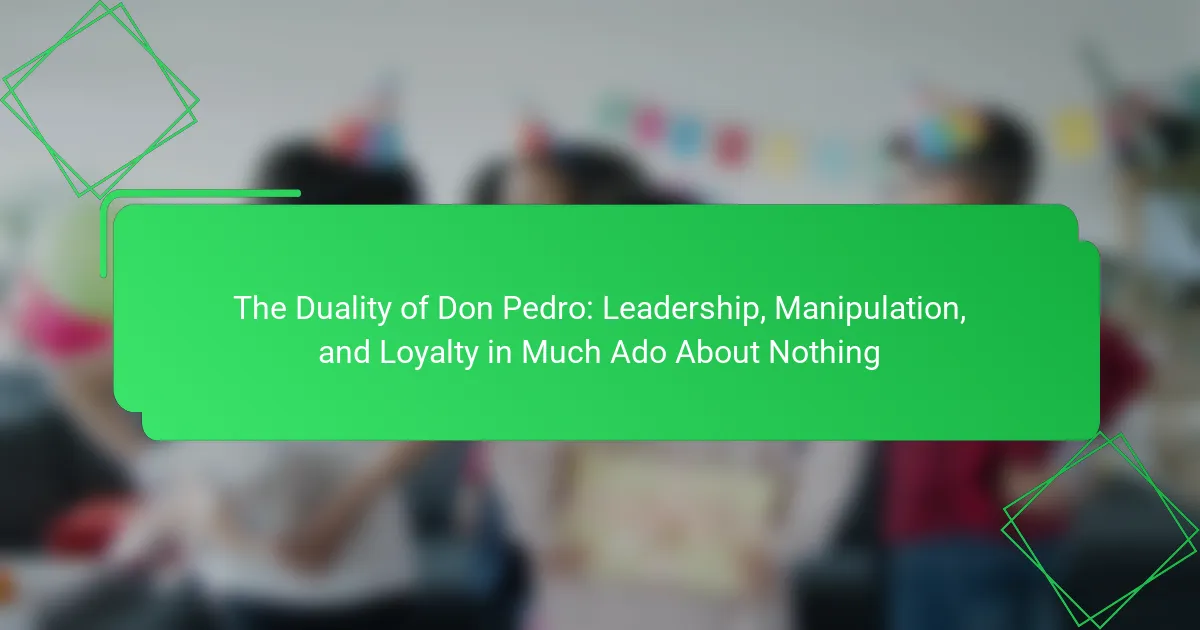
What is the Duality of Don Pedro in Much Ado About Nothing?
The duality of Don Pedro in Much Ado About Nothing manifests in his roles as a leader and a manipulator. He displays strong leadership qualities through his ability to unite characters and orchestrate events. For instance, Don Pedro facilitates the courtship of Claudio and Hero, showcasing his influence and authority. Conversely, his manipulative side emerges when he orchestrates the deception involving Benedick and Beatrice. This manipulation highlights a more self-serving aspect of his character. Ultimately, Don Pedro embodies both noble intentions and morally ambiguous actions, reflecting the complexities of human nature.
How does Don Pedro’s leadership manifest in the play?
Don Pedro’s leadership manifests through his ability to unite characters and orchestrate events. He takes charge during the masquerade ball, demonstrating his influence over social interactions. Don Pedro actively facilitates the courtship between Claudio and Hero, showcasing his role as a matchmaker. His strategic thinking is evident when he devises plans to expose and resolve misunderstandings. Additionally, he displays loyalty to his friends, particularly Benedick and Claudio, by supporting them in their romantic pursuits. His authority is challenged by the deception surrounding Don John, yet he remains committed to restoring harmony. Ultimately, Don Pedro’s leadership is characterized by charisma, decisiveness, and a desire for communal happiness.
What qualities define Don Pedro as a leader?
Don Pedro is defined as a charismatic and diplomatic leader. He possesses the ability to unite others under a common cause. His charisma draws people to him, fostering loyalty among his followers. Diplomatic skills allow him to navigate complex social situations effectively. He demonstrates decisiveness in his actions, leading to successful outcomes. Additionally, he shows a capacity for manipulation, using his influence to achieve goals. His loyalty to friends highlights his commitment to those he leads. These qualities collectively establish Don Pedro as a compelling leader in “Much Ado About Nothing.”
How do Don Pedro’s leadership choices impact other characters?
Don Pedro’s leadership choices significantly influence the dynamics among other characters. His decision to orchestrate the romantic relationships shapes the interactions between Claudio and Hero. This manipulation leads to misunderstandings and ultimately a public shaming of Hero. Don Pedro’s role as a mediator fosters camaraderie among the men, but it also creates tension when his intentions are misinterpreted. His leadership style encourages loyalty in some, like Claudio, but breeds resentment in others, such as Benedick, who feels overshadowed. Furthermore, his choices reflect a blend of benevolence and self-interest, complicating his relationships. Overall, Don Pedro’s leadership choices create a ripple effect, impacting trust and loyalty among the characters.
In what ways does Don Pedro manipulate those around him?
Don Pedro manipulates those around him through strategic social interactions and deception. He orchestrates the romantic entanglements between Claudio and Hero, influencing their relationship dynamics. Don Pedro uses his status to gain trust and leverage, making others feel indebted to him. He employs schemes, such as the masquerade ball, to conceal true intentions. His manipulation is evident when he falsely presents himself as Claudio to woo Hero. This tactic highlights his ability to control perceptions and outcomes. Additionally, he plays on emotions, such as jealousy and pride, to further his goals. Don Pedro’s actions demonstrate a calculated approach to leadership and influence.
What are the key instances of manipulation by Don Pedro?
Don Pedro manipulates several situations in “Much Ado About Nothing.” He orchestrates the courtship between Claudio and Hero. Don Pedro approaches Hero on Claudio’s behalf, presenting himself as a suitor. This act misleads Hero into believing Claudio is directly pursuing her.
Additionally, Don Pedro devises the plan to feign Beatrice’s love for Benedick. He encourages Benedick to overhear conversations about Beatrice’s supposed affection. This manipulation aims to spark a romantic connection between them.
Moreover, Don Pedro’s manipulation extends to the public shaming of Hero. He allows Claudio to denounce Hero at their wedding, believing he is acting in Claudio’s best interest. This moment showcases his influence over the characters’ fates.
These instances illustrate Don Pedro’s dual role as a leader and manipulator, impacting relationships and events throughout the play.
How does manipulation affect the relationships in the play?
Manipulation significantly strains relationships in “Much Ado About Nothing.” Don Pedro’s manipulation of characters leads to misunderstandings and conflict. For instance, he orchestrates the courtship between Claudio and Hero, which ultimately creates tension. Additionally, the deception involving Benedick and Beatrice reveals how manipulation can distort genuine feelings. The negative consequences of these manipulations culminate in broken trust and emotional turmoil. Claudio’s public shaming of Hero exemplifies the destructive impact of deceit on relationships. Overall, manipulation serves as a catalyst for conflict and reveals the fragility of trust among characters.
What role does loyalty play in Don Pedro’s character?
Loyalty plays a significant role in Don Pedro’s character. He demonstrates unwavering loyalty to his friends and allies throughout “Much Ado About Nothing.” This loyalty is evident in his efforts to help Claudio win over Hero. Don Pedro actively orchestrates the courtship, showcasing his commitment to his friend’s happiness. His loyalty also extends to Beatrice and Benedick, as he supports their relationship. However, his loyalty can lead to manipulation, as he sometimes uses his influence to control situations. This duality highlights the complexity of his character. Ultimately, Don Pedro’s loyalty defines his relationships and actions within the narrative.
How does Don Pedro demonstrate loyalty to his friends?
Don Pedro demonstrates loyalty to his friends through his unwavering support and commitment. He actively seeks to help his friends achieve their desires. For instance, he orchestrates the courtship of Beatrice and Benedick, showing his dedication to their happiness. Additionally, he defends Claudio when he feels wronged by others. Don Pedro’s willingness to confront challenges on behalf of his friends highlights his loyalty. He also provides a sense of security and trust within their relationships. His actions consistently reflect a deep-seated loyalty that strengthens their bonds.
What are the consequences of loyalty in the context of Don Pedro?
Loyalty in the context of Don Pedro leads to both positive and negative consequences. Don Pedro’s loyalty to friends, like Claudio, fosters strong alliances and trust. This loyalty enables him to play a mediator role in relationships, enhancing his leadership image. However, his loyalty can also result in manipulation, as seen when he orchestrates the courtship of Hero. This manipulation can lead to misunderstandings and tragic outcomes, such as the public shaming of Hero. Furthermore, loyalty can create conflicts, as seen in the tension between Don Pedro and Don John. Don John’s betrayal highlights the fragility of loyalty and its potential to cause rifts among allies. Ultimately, loyalty shapes Don Pedro’s character and influences the dynamics of the relationships around him.

How do the themes of leadership, manipulation, and loyalty intersect in Don Pedro’s character?
Don Pedro’s character embodies the intersection of leadership, manipulation, and loyalty. As a leader, he commands respect and authority among his peers. His manipulation is evident in how he orchestrates events to achieve his goals, such as bringing Beatrice and Benedick together. This manipulation often stems from his loyalty to his friends, as he seeks to ensure their happiness. Furthermore, Don Pedro’s leadership is sometimes compromised by his willingness to manipulate situations for personal gain. His actions reflect a complex balance between guiding others and using cunning tactics. Ultimately, these themes converge in his character, revealing the dual nature of his intentions and relationships.
What are the implications of Don Pedro’s duality for the overall narrative?
Don Pedro’s duality significantly impacts the overall narrative by highlighting the complexities of leadership and loyalty. His ability to shift between a benevolent leader and a manipulative figure creates tension within the story. This duality influences the relationships among characters, particularly in how trust is established and broken. For instance, Don Pedro’s role in matchmaking reveals his genuine intentions but also exposes his capacity for manipulation. The consequences of his actions lead to misunderstandings and conflicts, driving the plot forward. Ultimately, this duality serves to explore themes of honor and deception, shaping the characters’ journeys and the narrative’s resolution.
How do other characters respond to Don Pedro’s dual nature?
Other characters respond to Don Pedro’s dual nature with a mix of admiration and suspicion. His leadership qualities earn him respect among his peers. Characters like Claudio view him as a noble figure who orchestrates their romantic pursuits. However, his manipulative tendencies raise concerns. For instance, Benedick questions the morality of Don Pedro’s schemes. Additionally, Beatrice expresses skepticism about his intentions. The contrast between admiration for his charisma and wariness of his manipulation reflects the complexity of his character. This duality influences the dynamics of relationships within the play.

What lessons can be learned from Don Pedro’s duality in Much Ado About Nothing?
Don Pedro’s duality in Much Ado About Nothing illustrates the complexities of leadership and manipulation. His ability to navigate social dynamics reveals the importance of perception in leadership roles. Don Pedro demonstrates that charisma can mask ulterior motives. He skillfully influences others, showcasing the power of persuasion. However, his actions also highlight the risks of manipulation, leading to unintended consequences. The lessons emphasize the need for integrity in leadership. Trust can be easily broken through deceitful actions. Ultimately, Don Pedro’s character serves as a cautionary tale about the balance between influence and ethical responsibility.
What insights can we gain about leadership from Don Pedro’s actions?
Don Pedro’s actions reveal key insights about leadership, particularly in the realms of influence and trust. He demonstrates the ability to unite others under a common goal. His strategic manipulation of relationships showcases how leaders can shape perceptions. Don Pedro’s loyalty to his friends highlights the importance of trust in leadership. He effectively mediates conflicts, showing a leader’s role in maintaining harmony. Additionally, his willingness to take risks reflects the courage required in leadership. These actions illustrate that effective leaders must balance authority with empathy.
How can manipulation be both a tool and a weapon in leadership?
Manipulation can serve as both a tool and a weapon in leadership. As a tool, manipulation can help leaders influence and motivate their followers. It allows them to steer group dynamics towards beneficial outcomes. For instance, leaders may use persuasive communication to align team goals with individual aspirations. This fosters loyalty and commitment among team members.
Conversely, manipulation can act as a weapon when used to deceive or control others for personal gain. Leaders may exploit their authority to mislead subordinates. This can create distrust and resentment within the team. Historical examples illustrate this duality. Machiavelli’s “The Prince” discusses how leaders may manipulate perceptions to maintain power. This highlights the ethical implications of manipulation in leadership contexts.
What can we learn about the importance of loyalty in relationships?
Loyalty in relationships fosters trust and strengthens bonds. It encourages open communication and mutual support. In “Much Ado About Nothing,” loyalty is a central theme that influences character dynamics. Don Pedro’s loyalty impacts his friendships and romantic pursuits. Betrayal of loyalty leads to conflict and misunderstandings. For example, Claudio’s disloyalty to Hero results in public shame and distress. Loyalty promotes stability and resilience in relationships. It cultivates a sense of belonging and commitment among individuals.
How can we apply the lessons from Don Pedro’s character to modern leadership?
Don Pedro’s character teaches valuable lessons for modern leadership through his approach to collaboration and loyalty. He exemplifies the importance of building alliances for mutual benefit. His ability to unite characters like Benedick and Beatrice showcases the power of fostering relationships. Effective leaders today can learn to create environments that encourage teamwork. Don Pedro’s manipulation of situations demonstrates strategic thinking, essential for navigating complex challenges. Additionally, his loyalty to friends highlights the significance of trust in leadership. Trust fosters a supportive culture, essential for achieving organizational goals. Overall, Don Pedro’s character illustrates that successful leadership involves collaboration, strategic thinking, and trust-building.
The main entity of the article is Don Pedro from Shakespeare’s “Much Ado About Nothing.” The article explores the duality of Don Pedro as both a leader and a manipulator, highlighting his ability to unite characters and orchestrate events while also engaging in deceptive tactics. Key themes include the manifestation of his leadership qualities, the impact of his manipulation on relationships, and the significance of loyalty in his character. The article also examines the implications of Don Pedro’s actions for the narrative and offers insights into modern leadership practices drawn from his complex character.


